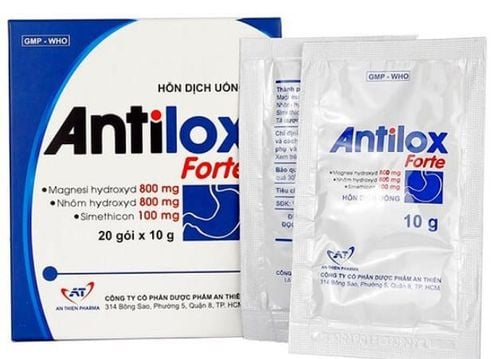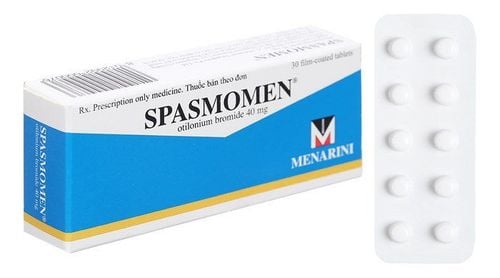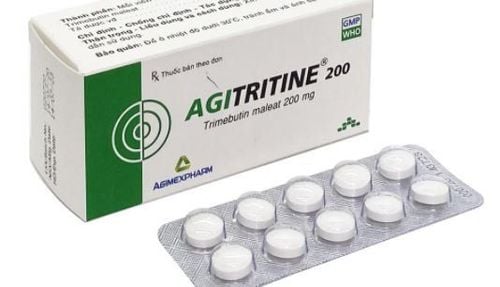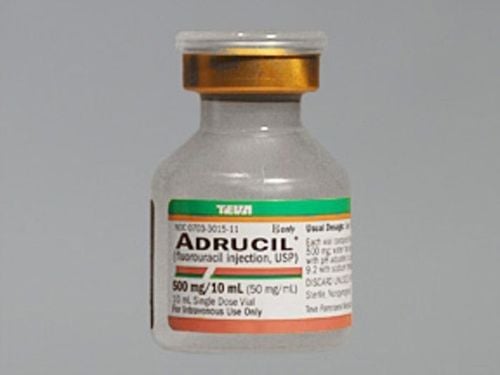This is an automatically translated article.
The colon is a vulnerable organ to many different diseases, the most common of which is colitis. This disease can cause many dangerous complications if not treated appropriately. So, what drugs should be used to treat ulcerative colitis?
1. Overview of inflammatory bowel disease
Before going to find the answer to the question, what medicine to take with colitis, the patient needs to have basic knowledge about this disease. The colon (also known as the large intestine in folklore) is the organ that stores, then converts food into stool and excretes it through the rectum. Therefore, the colon is very vulnerable because the environment is very favorable for pathogenic microorganisms to grow. Among the diseases associated with this organ, colitis is the most common, characterized by localized or diffuse inflammation of the colonic mucosa.
According to doctors, colitis includes 2 stages: acute inflammation and chronic inflammation. The acute inflammatory phase occurs suddenly, closely related to factors of food safety and environmental hygiene. If left untreated, acute colitis will turn into a persistent chronic phase, increasing the risk of complications and especially being difficult to treat definitively.
Some dangerous complications of colitis:
Hemorrhage: This complication occurs when the colon mucosa is severely inflamed, leading to damage to the protective villi. The final consequence is that the colon mucosa is congested, bleeding, and when not treated, the body endangers the patient's life due to acute blood loss; Dilatation of the colon: If this disease progresses for a long time, there will be a risk of developing colon dilatation complications, thereby seriously affecting the digestive function and more seriously the ulcerative condition causing perforation of the colon; Colon perforation: Colitis caused by prolonged antibiotic use causes the beneficial bacteria in the gut to be destroyed and at the same time the protective villi become bare. At that time, the mucosal ulcers will go deep and erode the colon wall, leading to the risk of colon perforation for a long time; Colon cancer: This is considered the most dangerous complication of colitis. The phenomenon of mucosal ulceration that persists or recurs many times increases the risk of dysplasia and the appearance of malignant cells.
2. Some notes when treating colitis
Colitis can cause many complications affecting health, so the use of medication treatment is very necessary. However, in order for the treatment of colitis with Western medicine to be most effective, patients should note the following issues:
Use drugs as prescribed by the doctor: Currently, many types of anti-inflammatory drugs are available. colon , especially new generation antibiotics, are used only with a doctor's prescription. However, in Vietnam, self-medication and self-medication are quite common, which causes many different consequences, including drug resistance. Therefore, patients only use drugs for colitis according to the doctor's prescription; Use the drug in the correct dose and time prescribed; Pay attention to the expiration date of drugs for colitis; Never use an old prescription or someone else's prescription; Note contraindications and cautions of drugs to treat colitis: For example, antibiotics should be used with caution in pregnant women, patients with kidney or liver failure.
3. What drugs do patients with colitis take?
The first problem to confirm is that until now, colitis has not been completely cured. Currently used colitis drugs are mainly used to support and relieve symptoms. So what drugs do patients with colitis take?
3.1. Group of analgesics and antispasmodics Patients with colitis who have symptoms such as abdominal pain and spasms along the colonic frame can be prescribed antispasmodic and analgesic drugs depending on the severity, such as: following:
Trimebutine: The dosage is 100mg and it is recommended to use 1-6 tablets/day; Mebeverine: Made in the form of 100mg tablets and doctors recommend 2-4 tablets/day; Phloroglucinol: 80mg tablet form and recommended by doctors to take 4 tablets per day. For the tablet form placed under the tongue, use 2 tablets / day, and for intravenous form (content 40mg), use 1-3 ampoules / day. Note: The drugs for colitis mentioned above only work to relieve pain and prevent muscle spasms, besides, they also help reduce bloating and abdominal distension.
3.2. Medications to treat constipation or diarrhea Patients with colitis who defecate less than 3 times a week and have dry, hard stools that cause pain in the anus will be prescribed anti-constipation medications, including:
Bisacodyl: Prepared in tablet form and recommended to use 1-2 tablets/day in adults; Normacol: Prepared in the form of sugar-coated nuggets, it is suitable for children from 6 years of age and older; Forlax (or Macrogol): Prepared in powder form for solution and recommended to use 1-2 packs/day. Note: Anti-constipation drugs can be used for a long time in patients with colitis until defecation is favorable. In combination with medication, patients should change their diet, increase fiber-rich foods and make sure to drink enough water.
The opposite of constipation is loose stools. When patients with colitis have signs of diarrhea, the doctor will consider using drugs that inhibit intestinal motility or create a membrane covering the mucosa to control diarrhea. Some common diarrhea-reducing colitis medications include:
Loperamide: It is recommended to start using 2 tablets / time, if diarrhea continues, take 1 more tablet every 4-6 hours; Diarsed: Prepared in the form of sugar coated tablets. In case of acute diarrhea, 2 tablets can be used for the first time. For patients with colitis with chronic diarrhea, doctors recommend taking 1-2 tablets per day; Some other anti-diarrheal drugs used by patients with colitis are Smecta, Actapulgite, Imodium... 3.3. Antibiotics Antibiotics are used in inflammatory bowel disease to destroy harmful bacteria in the intestinal tract. Some antibiotics for colitis that patients may be prescribed by a doctor include:
Metronidazol: 250mg tablets with the recommended dose of 4 tablets/day; Ciprofloxacin: This is an antibiotic of the quinolone group, made in the form of 500mg tablets and the recommended dose is 4 tablets/day; Trimethoprim: Prepared in 480mg tablet form and recommended dose is 2 tablets/day. Antibiotics used to treat colitis are only allowed by a doctor for a maximum of 5-7 days. Patients should avoid prolonged use to limit unwanted effects.
4. Pros and cons of drugs for colitis
Western medicine to treat colitis mainly works to relieve symptoms with the following advantages:
Easy to use; The effect brings quickly to help the uncomfortable symptoms of colitis such as abdominal pain, diarrhea, constipation... markedly relieved or disappeared in a short time; The price is suitable for many patients. However, the drugs to treat colitis still have some disadvantages as follows:
Antibiotic resistance if the patient uses it for a long time: Colitis is easy to recur. Use different antibiotics for treatment. Thus increasing the risk of developing strains of bacteria that are resistant to currently available antibiotics; Long-term use of anti-inflammatory drugs increases the risk of abnormal fluid retention, obesity or the onset of diabetes...; Antibiotics can kill both good and bad bacteria in the gut. For a long time, it leads to an imbalance of intestinal microflora and causes damage to the protective lining of the colon, the final result is that the patient is prone to flatulence, abdominal distension and digestive disorders; Note: Antibiotics for colitis are only temporarily effective. Patients are still at risk of recurrence or progression to chronic colitis if treatment is not appropriate. It is best that when diagnosed with colitis, the patient should go to medical facilities to be examined and treated under the advice of a specialist doctor so that the disease condition can be improved soon, minimizing complications of the disease. after.
Please dial HOTLINE for more information or register for an appointment HERE. Download MyVinmec app to make appointments faster and to manage your bookings easily.













